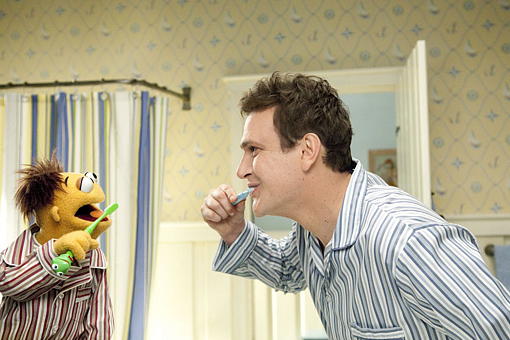By Pam Glazier · November 28, 2011

There’s a sort of homegrown quality about the Muppets. As long as they’ve been around, the Muppets have been a motley assortment of weirdoes that evolved into a kind of genial-everyman-type of family. With their tendencies toward inclusion and acceptance, we watched the cheesy humor and crazy personalities gel into a warm and fuzzy reflection of the best parts of what all our own families are. In essence, the Muppets shouldn’t click with each other, but they do anyway despite their differences—and that’s the universal trait of family.
This most recent Muppet movie is no different. Time and life has pulled all the characters apart, but the seed of what they were fosters itself within the heart of Walter (Peter Linz). Walter is a Muppet who felt different all of his life. While his human brother Gary (Jason Segel) grew taller and experienced new things, he stayed the same height and sort of felt left out of life. But then he saw The Muppet Show and everything changed. He finally felt like there were others out there like him, and thus he was finally okay with being himself. On a trip to Los Angeles, Walter learns that evil oil magnate Tex Richman (Chris Cooper) plans to demolish the Muppet Studios to drill for oil underneath it. Therefore, clearly Walter must find a way to save the Muppets before their legacy is destroyed forever.
There is a theme that runs through this film that suggests we all should face-palm the negative forces in this world in order to try our best at creating something positive. And even though it’s hard and people may laugh in your face and you may even fail, the attempt is worth it because it’s these attempts that define you. Just keep smiling as the jerks of the world twist the knife – there’s a silver lining in there somewhere. Of course, it’s hard to sell a message like this because the world today is extremely cynical. There had to be a build-up to the blinding optimism of this film, and the story pulls it off. The over-the-top hokeyness of Gary (Jason Segel) and his fiancé Mary (Amy Adams) is at first silly, but soon becomes endearing because they just won’t stop. They are marathon do-gooders and smile-makers. And this small town charm—literally, they are from Smalltown, USA—breaks through our defenses and puts us in a hot cocoa and Jimmy Stewart mood. Thus, we are actually into it when the musical dance numbers hit, and we are delighted when we discover that they tap through part of it.
This movie is also highly self-referential. There is a vital plot-point that is delivered with heavy exposition early on in the film, and then the characters delivering the exposition comment on the fact that the scene they are in is really heavy with boring dialog and that they hope it’s expositionaly relevant to the film; otherwise, it’s just a crappy scene. And it would have been pretty bland without this breach of “the fourth wall.” There’s another moment where Kermit tells Walter that he can’t get the Muppets together because it would be too difficult. Mary sighs disappointedly and says, “this is going to be the shortest movie ever.” These moments are a sort of wink to the audience that coaxes us along into the facile plot that has been set up.
The movie, through gentle prods, orders us to stop deconstructing, and just go with it. And it works. We forgive the fact that the villain is extremely two-dimensional—he might as well have had a top hat and long waxed moustache. And we also forgive the fact that the Muppets and two human leads are all exceedingly two-dimensional in a bright-eyed and bushy tailed sort of way. It’s a simple story, and these characters are simple characters, and when put together, it’s all perfectly simple. Because the film is set up like this, more complex themes about happiness and togetherness can be explored without being all “merchant-ivory-esque.” James Cameron tried this with Avatar, and he succeeded, but not without millions of internet trolls decrying the simplistic ridiculousness of his work. Here the trolls will find themselves unnecessary because the film has done it for them. “Sure,” it seems to say, “this is implausible, but let’s explore the themes anyway.” And this is why it wins.
Beyond all the heart-warming themes and messages, this movie also delivers laughs. And the laughs are silly, enjoyable stuff—like watching a kitten attack a shadow. Well, maybe not *that* nauseatingly cute, but the humor is definitely on a lighter end of the spectrum.
So go see it. Adults will find it a smart, funny return to childhood innocence, and kids will like it. All the kids in the theater that I saw it in applauded at the end, and I think a few of them raised their arms in a fist and yelled “yeah!” That’s an indication of kid-pleasure, right? Either way, I strongly recommend it.